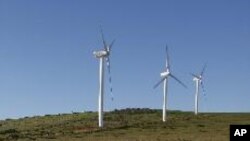More than 130 world leaders are expected to gather in Rio de Janeiro next month for the summit, which is also referred to as "Rio+20," a nod to the 20th anniversary of the original Rio Summit. The goal of the meeting is to secure political commitment toward sustainable development and energy, as well as addressing new and emerging challenges.
Nearly two billion people, about one-third of the world’s population, don't have access to energy, according to the United Nations.
At a preview of the summit, at the non-profit Center for Global Development in Washington, UN Secretary General Ban Ki-moon said the best way to fight poverty is through energy. But he cautioned the earth has limited resources.
“We are using 1.3 times more than we have," Ban said. "If you have to spend 1.3 times more than your salary, what would happen to the whole economy? What would happen to the companies? They will all bankrupt."
Renewable energy is crucial and yet currently only represents 16 percent of the world's energy, according to Ban. That has to change, he said, especially since the burning of fossil fuels has a direct impact on climate change.
“Without addressing climate change properly, as soon as possible, like by 2020, then we’ll be heading to almost a tipping point of this planet earth," he said. "This is a slowly approaching threat to our world, to our future.”
Another issue is the current imbalance of energy consumption. While developing nations use large amounts of energy, many underdeveloped countries in Africa and Asia have few energy resources at all.
“If in the U.S. every person were to consume 10 kilowatt hours, 10 units of energy less per month, which is not a lot, that could save 4,000 megawatts of generation capacity," said Vijay Iyer, the World Bank's director of Energy, "which is the combined demand today of Kenya, Uganda, Tanzania and Rwanda.”
But to accomplish the goal of energy for all, Iyer said, the world needs to increase today’s annual investment of $9 billion to $45 billion a year, which presents a difficult challenge.
Ban said the political will of world leaders will be decisive in achieving the goals of Rio + 20, most especially that of U.S. President Barack Obama.
“President Obama’s role will be crucial again, as the number one world’s economy, as the most powerful and leadership country, we count on the United States,” Ban said.
It's not known yet whether Obama will attend the summit. Ban said he hopes the president will participate, right after the G20 summit meeting in Mexico.
Nearly two billion people, about one-third of the world’s population, don't have access to energy, according to the United Nations.
At a preview of the summit, at the non-profit Center for Global Development in Washington, UN Secretary General Ban Ki-moon said the best way to fight poverty is through energy. But he cautioned the earth has limited resources.
“We are using 1.3 times more than we have," Ban said. "If you have to spend 1.3 times more than your salary, what would happen to the whole economy? What would happen to the companies? They will all bankrupt."
Renewable energy is crucial and yet currently only represents 16 percent of the world's energy, according to Ban. That has to change, he said, especially since the burning of fossil fuels has a direct impact on climate change.
“Without addressing climate change properly, as soon as possible, like by 2020, then we’ll be heading to almost a tipping point of this planet earth," he said. "This is a slowly approaching threat to our world, to our future.”
Another issue is the current imbalance of energy consumption. While developing nations use large amounts of energy, many underdeveloped countries in Africa and Asia have few energy resources at all.
“If in the U.S. every person were to consume 10 kilowatt hours, 10 units of energy less per month, which is not a lot, that could save 4,000 megawatts of generation capacity," said Vijay Iyer, the World Bank's director of Energy, "which is the combined demand today of Kenya, Uganda, Tanzania and Rwanda.”
But to accomplish the goal of energy for all, Iyer said, the world needs to increase today’s annual investment of $9 billion to $45 billion a year, which presents a difficult challenge.
Ban said the political will of world leaders will be decisive in achieving the goals of Rio + 20, most especially that of U.S. President Barack Obama.
“President Obama’s role will be crucial again, as the number one world’s economy, as the most powerful and leadership country, we count on the United States,” Ban said.
It's not known yet whether Obama will attend the summit. Ban said he hopes the president will participate, right after the G20 summit meeting in Mexico.




